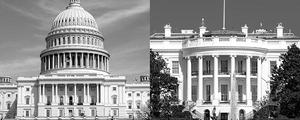Story Highlights
- 61% say they are better off than three years ago
- No more than 50% have said this in past election cycles
- Evaluations of U.S. world standing mostly similar to past elections
WASHINGTON, D.C. -- Sixty-one percent of Americans say they are better off than they were three years ago, a higher percentage than in prior election years when an incumbent president was running. In the 1992, 1996 and 2004 election cycles, exactly half said they were better off. In three separate measures during the 2012 election cycle, an average of 45% said they were better off.
| Yes, better off | No, not better off | As well off (vol.) | |||||||||||||||||||||||||||||||||||||||||||||||||||||||||||||||||||||||||||||||||||||||||||||||||
|---|---|---|---|---|---|---|---|---|---|---|---|---|---|---|---|---|---|---|---|---|---|---|---|---|---|---|---|---|---|---|---|---|---|---|---|---|---|---|---|---|---|---|---|---|---|---|---|---|---|---|---|---|---|---|---|---|---|---|---|---|---|---|---|---|---|---|---|---|---|---|---|---|---|---|---|---|---|---|---|---|---|---|---|---|---|---|---|---|---|---|---|---|---|---|---|---|---|---|---|
| % | % | % | |||||||||||||||||||||||||||||||||||||||||||||||||||||||||||||||||||||||||||||||||||||||||||||||||
| 2020 | 61 | 36 | 3 | ||||||||||||||||||||||||||||||||||||||||||||||||||||||||||||||||||||||||||||||||||||||||||||||||
| 2012 | 45 | 52 | 3 | ||||||||||||||||||||||||||||||||||||||||||||||||||||||||||||||||||||||||||||||||||||||||||||||||
| 2004 | 50 | 42 | 8 | ||||||||||||||||||||||||||||||||||||||||||||||||||||||||||||||||||||||||||||||||||||||||||||||||
| 1996 | 50 | 34 | 15 | ||||||||||||||||||||||||||||||||||||||||||||||||||||||||||||||||||||||||||||||||||||||||||||||||
| 1992 | 50 | 38 | 11 | ||||||||||||||||||||||||||||||||||||||||||||||||||||||||||||||||||||||||||||||||||||||||||||||||
| (vol.) = volunteered response; Data for 1992, 1996 and 2020 based on poll conducted in January of the election year. Data for 2012 based on average of three polls conducted in October 2011, December 2011 and August 2012. Data for 2004 based on an October 2003 poll. | |||||||||||||||||||||||||||||||||||||||||||||||||||||||||||||||||||||||||||||||||||||||||||||||||||
| Gallup | |||||||||||||||||||||||||||||||||||||||||||||||||||||||||||||||||||||||||||||||||||||||||||||||||||
The current results, from a Jan. 16-29 Gallup poll, echo record highs, measured earlier in January, in Americans' satisfaction with the way things are going in their personal life and in their assessments of their personal finances.
Relatedly, 52% of U.S. adults say it is easier for them to "go and buy things in the stores" than it was three years ago, higher than in the 1992, 1996 and 2004 election cycles, when the figures were closer to 40%.
| Yes, easier | No, not easier | No opinion | |||||||||||||||||||||||||||||||||||||||||||||||||||||||||||||||||||||||||||||||||||||||||||||||||
|---|---|---|---|---|---|---|---|---|---|---|---|---|---|---|---|---|---|---|---|---|---|---|---|---|---|---|---|---|---|---|---|---|---|---|---|---|---|---|---|---|---|---|---|---|---|---|---|---|---|---|---|---|---|---|---|---|---|---|---|---|---|---|---|---|---|---|---|---|---|---|---|---|---|---|---|---|---|---|---|---|---|---|---|---|---|---|---|---|---|---|---|---|---|---|---|---|---|---|---|
| % | % | % | |||||||||||||||||||||||||||||||||||||||||||||||||||||||||||||||||||||||||||||||||||||||||||||||||
| 2020 | 52 | 36 | 11 | ||||||||||||||||||||||||||||||||||||||||||||||||||||||||||||||||||||||||||||||||||||||||||||||||
| 2004 | 41 | 46 | 13 | ||||||||||||||||||||||||||||||||||||||||||||||||||||||||||||||||||||||||||||||||||||||||||||||||
| 1996 | 42 | 40 | 16 | ||||||||||||||||||||||||||||||||||||||||||||||||||||||||||||||||||||||||||||||||||||||||||||||||
| 1992 | 36 | 51 | 12 | ||||||||||||||||||||||||||||||||||||||||||||||||||||||||||||||||||||||||||||||||||||||||||||||||
| (vol.) = volunteered response. 1992, 1996 and 2020 data based on poll conducted in January of the election year. 2004 data based on October 2003 poll. | |||||||||||||||||||||||||||||||||||||||||||||||||||||||||||||||||||||||||||||||||||||||||||||||||||
| Gallup | |||||||||||||||||||||||||||||||||||||||||||||||||||||||||||||||||||||||||||||||||||||||||||||||||||
Americans' perceptions of whether they are personally better off, and whether it is easier to buy things, appear to be influenced much more by their party leanings than by their economic situations. Sixty percentage points separate Republicans' (89%) and Democrats' (29%) assessments of whether they are better off than three years ago. Independents are essentially in the middle of the two groups, at 60%. Meanwhile, 64% of those in both upper- and middle-income households say they are better off, as do 49% of those in lower-income households.
The Republican-Democratic gap is smaller -- 44 points -- when people indicate whether it is easier for them to buy things than it was three years ago: 76% of Republicans versus 32% of Democrats say it is, as do 49% of independents.
The party gaps on the "better off than three years ago" question were much smaller in the past, partly because supporters of the incumbent president's party were less upbeat about their situations than Republicans are today.
| Republicans | Independents | Democrats | Party gap | ||||||||||||||||||||||||||||||||||||||||||||||||||||||||||||||||||||||||||||||||||||||||||||||||
|---|---|---|---|---|---|---|---|---|---|---|---|---|---|---|---|---|---|---|---|---|---|---|---|---|---|---|---|---|---|---|---|---|---|---|---|---|---|---|---|---|---|---|---|---|---|---|---|---|---|---|---|---|---|---|---|---|---|---|---|---|---|---|---|---|---|---|---|---|---|---|---|---|---|---|---|---|---|---|---|---|---|---|---|---|---|---|---|---|---|---|---|---|---|---|---|---|---|---|---|
| % | % | % | pct. pts. | ||||||||||||||||||||||||||||||||||||||||||||||||||||||||||||||||||||||||||||||||||||||||||||||||
| 2020 (Trump, Rep) | 89 | 60 | 29 | 60 | |||||||||||||||||||||||||||||||||||||||||||||||||||||||||||||||||||||||||||||||||||||||||||||||
| 2012 (Obama, Dem) | 27 | 46 | 60 | 33 | |||||||||||||||||||||||||||||||||||||||||||||||||||||||||||||||||||||||||||||||||||||||||||||||
| 2004 (GW Bush, Rep) | 64 | 48 | 37 | 27 | |||||||||||||||||||||||||||||||||||||||||||||||||||||||||||||||||||||||||||||||||||||||||||||||
| 1996 (Clinton, Dem) | 49 | 50 | 53 | 4 | |||||||||||||||||||||||||||||||||||||||||||||||||||||||||||||||||||||||||||||||||||||||||||||||
| 1992 (GHW Bush, Rep) | 66 | 49 | 36 | 30 | |||||||||||||||||||||||||||||||||||||||||||||||||||||||||||||||||||||||||||||||||||||||||||||||
| Gallup | |||||||||||||||||||||||||||||||||||||||||||||||||||||||||||||||||||||||||||||||||||||||||||||||||||
In addition to higher ratings among Republicans, today's higher figures are also driven by more positive ratings among independents -- 60% today, compared with ratings near 50% in prior years.
Assessments of U.S. International Standing Similar to Past Elections
The majority of Americans do not believe the U.S. is as respected throughout the world as it was three years ago -- 38% say it is and 59% say it is not. The percentage who think the U.S. is as respected is no worse than in past election years, with only as many as 40% saying so (in 1992 and 2000).
Additionally, 51% say the nation is as safe and strong as it was three years ago, while 43% say it is not. These readings are similar to what Gallup measured in the 2004 and 2012 election cycles, but lower than in 1992.
| Yes | No | More/Stronger (vol.) | ||||||||||||||||||||||||||||||||||||||||||||||||||||||||||||||||||||||||||||||||||||||||||||||||||
|---|---|---|---|---|---|---|---|---|---|---|---|---|---|---|---|---|---|---|---|---|---|---|---|---|---|---|---|---|---|---|---|---|---|---|---|---|---|---|---|---|---|---|---|---|---|---|---|---|---|---|---|---|---|---|---|---|---|---|---|---|---|---|---|---|---|---|---|---|---|---|---|---|---|---|---|---|---|---|---|---|---|---|---|---|---|---|---|---|---|---|---|---|---|---|---|---|---|---|---|---|
| % | % | % | ||||||||||||||||||||||||||||||||||||||||||||||||||||||||||||||||||||||||||||||||||||||||||||||||||
| Is U.S. as respected throughout the world | ||||||||||||||||||||||||||||||||||||||||||||||||||||||||||||||||||||||||||||||||||||||||||||||||||||
| 2020 | 38 | 59 | 3 | |||||||||||||||||||||||||||||||||||||||||||||||||||||||||||||||||||||||||||||||||||||||||||||||||
| 2012 | 30 | 65 | 1 | |||||||||||||||||||||||||||||||||||||||||||||||||||||||||||||||||||||||||||||||||||||||||||||||||
| 2004 | 27 | 68 | 3 | |||||||||||||||||||||||||||||||||||||||||||||||||||||||||||||||||||||||||||||||||||||||||||||||||
| 2000 | 40 | 54 | -- | |||||||||||||||||||||||||||||||||||||||||||||||||||||||||||||||||||||||||||||||||||||||||||||||||
| 1996 | 34 | 58 | 2 | |||||||||||||||||||||||||||||||||||||||||||||||||||||||||||||||||||||||||||||||||||||||||||||||||
| 1992 | 40 | 50 | 6 | |||||||||||||||||||||||||||||||||||||||||||||||||||||||||||||||||||||||||||||||||||||||||||||||||
| Is nation as safe/strong | ||||||||||||||||||||||||||||||||||||||||||||||||||||||||||||||||||||||||||||||||||||||||||||||||||||
| 2020 | 51 | 43 | 6 | |||||||||||||||||||||||||||||||||||||||||||||||||||||||||||||||||||||||||||||||||||||||||||||||||
| 2012 | 49 | 47 | 1 | |||||||||||||||||||||||||||||||||||||||||||||||||||||||||||||||||||||||||||||||||||||||||||||||||
| 2004 | 53 | 30 | 16 | |||||||||||||||||||||||||||||||||||||||||||||||||||||||||||||||||||||||||||||||||||||||||||||||||
| 1992 | 64 | 29 | 4 | |||||||||||||||||||||||||||||||||||||||||||||||||||||||||||||||||||||||||||||||||||||||||||||||||
| (vol.) = Volunteered response | ||||||||||||||||||||||||||||||||||||||||||||||||||||||||||||||||||||||||||||||||||||||||||||||||||||
| Gallup | ||||||||||||||||||||||||||||||||||||||||||||||||||||||||||||||||||||||||||||||||||||||||||||||||||||
As on the economic items, wide party gaps exist on the international items. Seventy percent of Republicans, but only 9% of Democrats, believe the U.S. is as respected throughout the world as it was three years ago. Thirty-two percent of independents hold this view.
Also, 76% of Republicans, 51% of independents and 22% of Democrats believe the nation is as safe and strong as when President Donald Trump took office.
Trump Given More Credit Than Obama for Economic Improvements
Sixty-two percent give Trump a great deal or fair amount of credit for improvement in the state of the economy in the past few years -- more than the 51% giving former President Barack Obama the same level of credit.
| Great deal | Fair amount | Not much | None at all | ||||||||||||||||||||||||||||||||||||||||||||||||||||||||||||||||||||||||||||||||||||||||||||||||
|---|---|---|---|---|---|---|---|---|---|---|---|---|---|---|---|---|---|---|---|---|---|---|---|---|---|---|---|---|---|---|---|---|---|---|---|---|---|---|---|---|---|---|---|---|---|---|---|---|---|---|---|---|---|---|---|---|---|---|---|---|---|---|---|---|---|---|---|---|---|---|---|---|---|---|---|---|---|---|---|---|---|---|---|---|---|---|---|---|---|---|---|---|---|---|---|---|---|---|---|
| % | % | % | % | ||||||||||||||||||||||||||||||||||||||||||||||||||||||||||||||||||||||||||||||||||||||||||||||||
| Donald Trump | 37 | 25 | 19 | 18 | |||||||||||||||||||||||||||||||||||||||||||||||||||||||||||||||||||||||||||||||||||||||||||||||
| Barack Obama | 26 | 25 | 25 | 23 | |||||||||||||||||||||||||||||||||||||||||||||||||||||||||||||||||||||||||||||||||||||||||||||||
| Gallup, Jan. 16-29, 2020 | |||||||||||||||||||||||||||||||||||||||||||||||||||||||||||||||||||||||||||||||||||||||||||||||||||
In 2000, Americans gave Bill Clinton slightly more credit for the economy (68% great deal or fair amount) than they give Trump today.
In January 2018, Gallup asked Americans a similar question about Trump and Obama, albeit with a different question wording. At that time, more Americans gave Obama (56%) than Trump (49%) a "great deal" or "moderate amount" of credit.
The economy will likely be as potent an election issue as any other, but there is no dominant issue in the public's minds. In December, the economy was among the top six issues that U.S. adults rated as "extremely important" to their presidential vote. The latest poll, which asked Americans to choose among those six issues as the single most important to their vote, finds 29% choosing the economy and 25% healthcare. Fewer indicated that immigration (14%), gun policy (13%), education (11%) or terrorism (6%) is their top overall issue.
Bottom Line
If Trump asks Americans whether they are better off than before he came into office, most would say they are. Trump also gets more credit for recent economic improvements than Obama does, though majorities give both credit.
Trump was clear during his State of the Union that he plans to make the strength of the economy a major focus of his reelection campaign. Given Americans' generally positive ratings of the economy -- including a 63% job approval rating for Trump on the issue -- it is a sensible strategy. But with Trump's overall job approval rating still below the majority level, the ultimate question is whether his economic success will mean more to voters than the more controversial aspects of his presidency.
Learn more about public opinion metrics that matter for the 2020 presidential election at Gallup's 2020 Presidential Election Center.
View complete question responses and trends (PDF download).
Learn more about how the Gallup Poll Social Series works.




